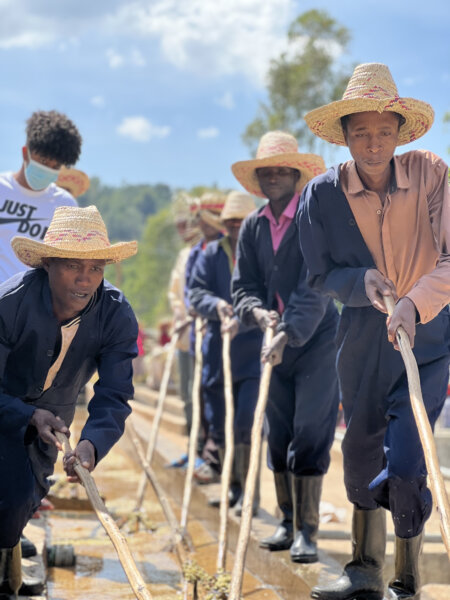About Idido #2

 Idido is a remote community in Ethiopia’s Yirgacheffe region. It’s home to one of the oldest coffee-growing traditions in the world.
Idido is a remote community in Ethiopia’s Yirgacheffe region. It’s home to one of the oldest coffee-growing traditions in the world.
To get to Idido we have to fly to Addis Ababa, Ethiopia’s capital, then take a 30 minute local flight to the city of Hawassa in Sidamo. In Hawassa we drive 4 hours on a paved road until we reach the Idido washing station in Yirgacheffe. In Idido the paved road ends and the dirt roads begin. Idido’s terrain is rugged and mountainous, so distance to the individual farms depends on where on the mountain they’re located. The closest farms to the city are 20 minutes away by motorcycle and the furthest ones are an hour away.
Most farms have access to dirt roads, so at harvest time producers transport bags of cherry by motorcycle, horse, or donkey to the nearest collection center. These bags then travel by truck to the central collection center in Idido. In general, transport between farms and collection centers is simple enough. This changes during November and December’s rainy season, which intersects with harvest. During the rainy season, temperatures reach 25℃/77℉, with higher humidity than the rest of the year. These conditions are ideal for coffee plants but troublesome for logistical operations in the field due to high chances of mud on dirt roads.
The producers of Idido intercrop their coffee with native trees of the area like the false banana tree to shade and fertilize their fields. Since the producers deliver all their coffee in cherry, they don’t have the waste generated by depulping to compost with, so the collection centers prepare and store organic compost and distribute it among the producers. Their coffee is fermented between 48 and 72 hours in fermentation tanks then dried between 4 and 5 days on raised beds, based on climate.
The majority of producers here belong to the Gedeo culture and speak the Gedeo language. The traditions of their native culture are still very present in producers’ daily life. For instance, birds and domestic animals like dogs and cats are highly respected in the Aricha and Idido areas.
Life in Idido can be idyllic in some ways, but equally complicated in others. Since many farms are remote, access to clean water, electricity, and school for children is a constant challenge. That means children from the most distant farms often start working from a very young age. Opportunities are very few in Idido, but migrating to other cities is not a great option for young people in the area due to the large education gaps between their region and the city. Many young people decide to stay on their parents’ farms or buy neighboring farms and continue dedicating themselves to coffee for the rest of their lives.



 Idido is a remote community in Ethiopia’s Yirgacheffe region. It’s home to one of the oldest coffee-growing traditions in the world.
Idido is a remote community in Ethiopia’s Yirgacheffe region. It’s home to one of the oldest coffee-growing traditions in the world.